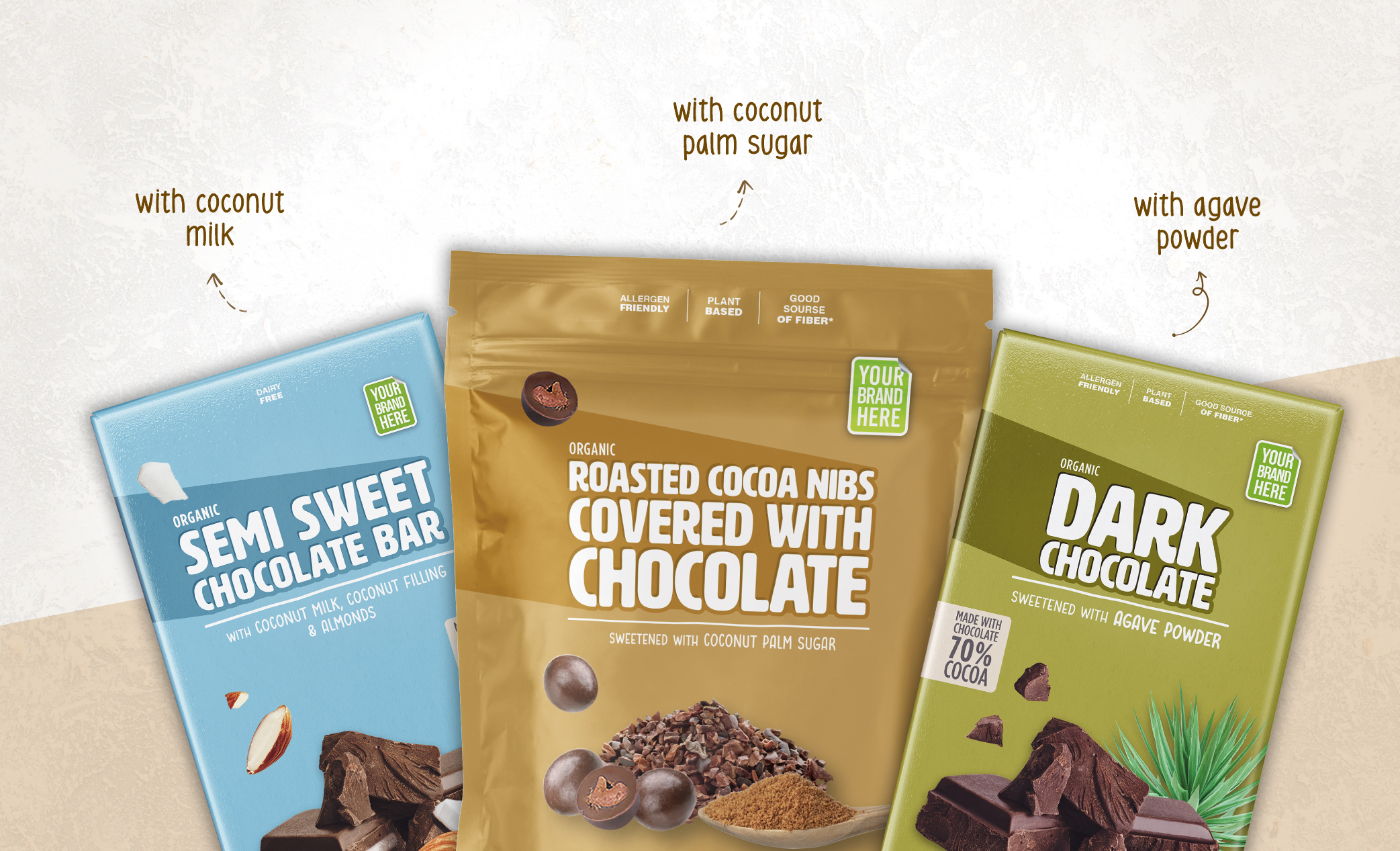
April 14, 2025
Plant-Based chocolate: The delicious and sustainable future
The plant-based segment has experienced impressive growth in recent years. According to a study by Nielsen in the categories of Chocolate Candy, Cookies, and Baking in the United States, segmented by strategic ingredient claim, the plant-based market has seen a 64% increase, with sales exceeding $9 million. As a result, this phenomenon reflects the growing demand from consumers for healthier, more ethical, and sustainable food options, which are transforming the chocolate industry.
The “Plant-Based” concept and Its relevance
The term “plant-based” refers to products made exclusively from plants, without any animal-derived ingredients. This approach has gained significant relevance in many industries, including chocolate, as consumers seek more ethical and healthy options. Plant-based chocolate is made without dairy, making it an ideal choice for those following a vegan diet, those with lactose intolerance, or anyone wanting to reduce their consumption of animal products.
What makes plant-based chocolate different?
Plant-based chocolate is made using pure cocoa and plant-based alternatives to traditional dairy products. Unlike conventional chocolate, which uses cow’s milk, plant-based chocolate opts for plant-based milks, such as:
- Almond milk: Mild and slightly sweet, providing a creamy texture.
- Oat milk: A popular choice for its creaminess and neutral flavor, ideal for pairing with cocoa.
- Coconut milk: With a tropical and creamy touch, coconut milk gives the chocolate a unique flavor profile.
These alternatives not only add flavor and texture but also offer additional benefits, such as lower saturated fat content compared to cow’s milk.
Benefits of plant-based chocolate
- Healthier: Generally richer in cocoa and less processed than milk chocolate, plant-based chocolate may have higher levels of antioxidants, such as cocoa flavonoids, which have cardiovascular and anti-inflammatory benefits.
- Lower sugar content: Many plant-based chocolate versions tend to have less added sugar, which can be an advantage for those looking to reduce their sugar intake.
- Better for the environment: Cocoa production, compared to cow’s milk production, has a lower environmental impact in terms of carbon footprint, water use, and resources. Plant-based products contribute to a more sustainable food production model.
Consumer preferences: Why choose plant-based?
The growing preference for plant-based products reflects a significant shift in consumer purchasing decisions. It is not just a trend, but a response to increasingly health, ethics, and sustainability-focused consumption patterns. In particular, consumers are seeking alternatives that align with their values and wellness goals, which is driving the growth of this market.
The Nielsen study, segmented by strategic ingredient claim, highlights that the plant-based market grew by 64% in the categories of Chocolate Candy, Cookies, and Baking, reaching over $9 million in sales. This growth clearly indicates that more and more consumers are choosing animal-free options, whether for health, ethical, or sustainability reasons.
- Health awareness: Consumers are increasingly informed about the benefits of a plant-based diet, not only for ethical or environmental reasons but also for its positive impact on health. Plant-based chocolate, being rich in cocoa and dairy-free, can be a healthier option for those looking to reduce their intake of saturated fats and refined sugars.
- Preference for ethical products: Today’s consumers are increasingly seeking products that align with their values. Plant-based chocolate offers an alternative for those who want to avoid animal-derived products, thus supporting animal welfare and reducing exploitation in the food industry.
- Sustainability as a priority: Concern for the environment plays a key role in purchasing decisions. Consumers are becoming more aware of the impact of food production on the planet and are opting for products that help reduce their carbon footprint. Plant-based chocolate, by avoiding dairy and using plant alternatives, generally has a lower ecological footprint than traditional chocolate.
- Diversification of options: The preference for plant-based options is also driven by the desire for variety and to explore new flavors. Many people who don’t follow a strictly vegan diet opt for plant-based products out of curiosity or to reduce their consumption of animal products, making plant-based chocolate an attractive option for both vegans and occasional consumers.
The future of plant-based chocolate: Innovations and opportunities
As demand for plant-based products continues to rise, chocolate companies have a great opportunity to innovate and offer unique flavor experiences. The sector is seeing an increase in experimentation with new plant ingredients and production methods, such as the use of superfoods (like spirulina or matcha) or even creating chocolate from different types of cocoa with more complex flavor profiles.
Moreover, chocolate brands can take advantage of growing trends in transparency and traceability in production, highlighting the origin of the cocoa, sustainable farming methods, and the ethics behind its production. These factors are not only appealing to consumers but also help build brand loyalty in an increasingly competitive market.
Conclusion
Plant-based chocolate is not only a delicious alternative for those looking to avoid dairy, but it is also aligned with global trends in health, sustainability, and ethics. With consumers preferring healthier and more responsible products, and with the continuous development in the quality and variety of these chocolates, the future of plant-based chocolate promises to be exciting and full of possibilities. Brands that adapt to this trend while maintaining high standards of quality and sustainability will be better positioned to meet the needs of a constantly evolving market.
Contact us!
& NEWS









